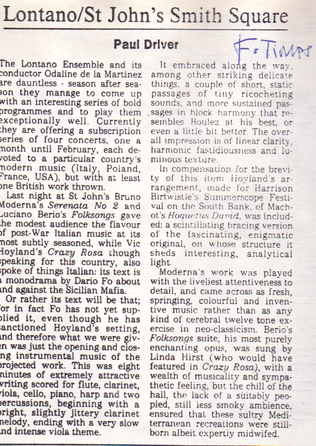Composer
Lontano/St. John's Smith Square
Works
Crazy Rosa
Paul Driver, September 1987
The Lontano Ensemble and its conductor Odaline de la Martinez are dauntless - season after season they manage to come up with an interesting series of bold programmes and to play them exceptionally well. Currently they are offering a subscription series of four concerts, one a month until February, each devoted to a particular country's modern music (Italy, Poland, France, USA), but with at least one British work thrown.
Last night at St John's Bruno Moderna's Serenata No 2 and Luciano Berio's Folksongs gave the modest audience the flavour of post-War Italian music at its most subtly seasoned, while Vic Hoyland's Crazy Rosa though speaking for this country, also spoke of things Italian: its text is a monodrama by Dario Fo about and against the Sicilian Mafia.
Or rather its text will be that; for in fact Fo has not yet supplied it, even though he has sanctioned Hoyland's setting, and therefore what we were given was just the opening and closing instrumental music of the projected work. This was eight minutes of extremely attractive writing scored for flute, clarinet, viola, cello, piano, harp and two percussions, beginning with a bright, slightly jittery clarinet melody, ending with a very slow and intense viola theme.
It embraced along the way, among other striking delicate things, a couple of short, static passages of tiny ricocheting sounds, and more sustained passages in block harmony that resembles Boulez at his best, or even a little bit better. The over-all impression is of linear clarity, harmonic fastidiousness and luminous texture.
In compensation for the brevity of this item Hoyland's arrangement, made for Harrison Birtwistle's Summerscope Festival on the South Bank, of Machot's Hoquetus David, was included: a scintillating bracing version of the fascinating, enigmatic original, on whose structure it sheds interesting, analytical light.
Moderna's work was played with the liveliest attentiveness to detail, and came across as fresh, springing, colourful and inventive music rather than as any kind of cerebral twelve tone exercise in neo-classicism. Berio's Folksongs suite, his most purely enchanting onus, was sung by Linda Hirst (who would have featured in Crazy Rosa), with a wealth of musicality and sympathetic feeling, but the chill of the hall, the lack of a suitably peopled, still less smoky ambience, ensured that these sultry Mediterranean recreations were still-born albeit expertly midwifed.
